Security-economy link: ‘Sky high debt’ worries COAS
Says when Karachi bleeds, Pakistan bleeds; vows city will remain safe and sound
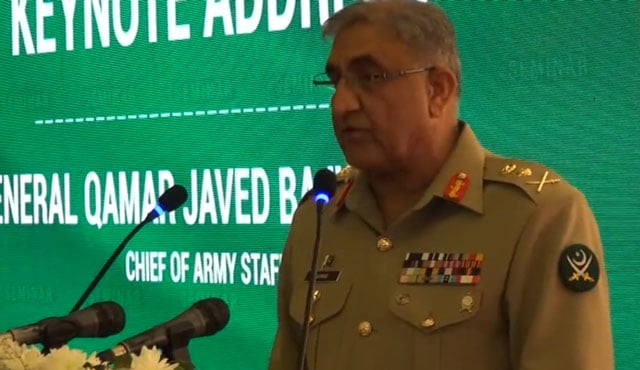
Army chief Gen Qamar Bajwa addresses a seminar in Karachi on Thursday. PHOTO: ISPR
Expressing concern over the country’s ‘sky-high’ debt, Chief of Army Staff General Qamar Javed Bajwa said on Wednesday national security and economy were interlinked, as he called for broadening tax base and bringing in financial discipline to break the ‘begging bowl’.
Addressing a seminar on ‘Interplay of Economy and Security’ in Karachi, Bajwa said Pakistan had a much improved security situation on the internal front as the security forces had defeated the challenges to the writ of the state, but warned that there was apparent fragility at places.
General Bajwa spoke as the keynote speaker at the seminar organised by the Inter-Services Public Relations (ISPR) in collaboration with the Federation of Pakistan Chambers of Commerce and Industry.
Pakistan ‘needs’ $31b this year to stay afloat
The army chief said that in today’s world, security and economy were interlinked and that the nations were reviewing the old dilemma of ‘guns versus butter’ i.e. how to achieve a balance between economic viability and national security.
However, he added that Pakistan never had the luxury of such a review in the wake of the crises one after another in the last four decades. “We have to continuously ensure a viable balance between economy and security. Only then will we arrive at a future that ensures sustained peace,” he stressed.
The army chief said Pakistan’s economy was showing mixed indicators as “the growth has picked up, but the debts are also sky high”. Infrastructure and energy, he added, had improved considerably, but the current account balance remained not in Pakistan’s favour.
“The common man across Pakistan needs reassurance of benevolent and equal treatment from the state,” he said, adding that it was high time for the country to place economic growth and sustainability at the highest priority.
Gen Bajwa remarked that Pakistan is capable of creating sufficient fiscal space to address structural problems through tax reforms, documenting economy, diversifying the export base, and encouraging savings to finance a level of investment that could sustain growth rate higher than the rise of population.
“For a secure future, we must be ready to take difficult decisions. We have to increase our tax base, bring in fiscal discipline and ensure continuity of economic policies,” he said. “We have to ensure that Balochistan, Interior Sindh, Fata (Federally-Administered Tribal Areas), southern Punjab and Gilgit-Baltistan also join us on the trajectory of growth and then move forward.”
He warned that at present, Pakistan was a strategically challenged state and external actors were attempting to assert control and dictate the country’s security priorities, “which have strong linkages to its economic future”.
The importance of Karachi
He continued, “In today’s world, security does not come cheap. It is dependent upon economic prowess. It is here that our entrepreneurs must contribute by producing and exporting more. We have done our part on the security front, now it’s up to you (entrepreneurs) to take initiative and turn the economy around.”
The task at hand was difficult, the army chief noted, but added that the Pakistani nation had done it before. “We are just finding our feet with improved security,” he went on. “If any nation can survive what we went through, it can also make its mark when the going is relatively easier.”
Gen Bajwa told the audience that Pakistan had a much improved security situation on the internal front. “The challenges to the state’s writ have been defeated, though residual threat still resides. The situation is stable but there is apparent fragility at places,” he noted.
He underscored the need for a comprehensive effort to pursue the anti-terror National Action Plan (NAP) and remove vulnerabilities before those could turn into threats.
“Many of the planned measures, if implemented timely, will contribute directly to the economic and even political stability of the country,” he said, emphasising that police and judicial reforms were the ‘obvious examples’.
He pointed out that due to the sustained hard work of the army and other law-enforcement agencies, the improvement in security environment had started to pay off as the country hosted many mega events in the fields of sports and culture this year.
“Recently, we not only had the most peaceful Muharram in years but the Bohra community validated our claim of improved security by selecting Pakistan for their annual gathering. Similarly, early harvest projects, both CPEC (China-Pakistan Economic Corridor) and non-CPEC, are nearing completion, with Pakistan Army providing security to our Chinese friends,” he added.
Dar’s legacy: a heavily-indebted Pakistan
The army chief also spoke about the importance of madrassah reforms, saying, “We cannot afford to leave a large segment of our youth with limited options.” Madrassahs, he continued, must enable their students to become useful members of society.
At the micro-level, he said nothing exemplified the linkage between economy and security better than the city of Karachi – the economic capital of Pakistan that generates a significant part of the national revenue.
“When our enemies want to choke Pakistan, they try to destabilise Karachi because when Karachi bleeds, Pakistan bleeds. It is because of this sensitivity that peace in Karachi has been our top priority,” he said, assuring the countrymen that Karachi would remain “safe and sound now”.
The army chief said the South Asian region, particularly Pakistan’s immediate neighbourhood, had failed to take off due to peculiar security challenges.
“The region will sink or sail together. I want to convey to our neighbours to the east and to the west that our destinies are inextricably linked,” he warned.
“We are making a deliberate and concerted effort to pacify the western border through a multitude of diplomatic, military and economic initiative,” he said. “We have also expressed and demonstrated our genuine desire to have normal and peaceful relations with India, however, it takes two to tango.”
Gen Bajwa said that the CPEC was a complete development platform and there would never be any compromise on it. “This is the future of our people, a vital national interest on which we will never compromise, regardless of the loudness of opposing voices.”
The CPEC, he added, had the potential to act as a powerful springboard for shared development in the entire Central Asia-South Asia (Casa) region. “It is also an example of regional cooperation and a break from politics of confrontation – we want all to benefit from this project,” he added.
(WITH ADDITIONAL INPUT FROM NEWS DESK)

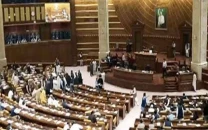
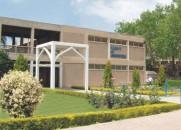
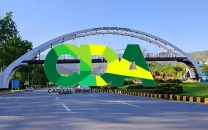
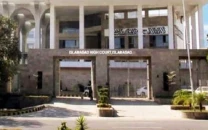
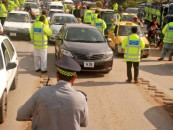













COMMENTS
Comments are moderated and generally will be posted if they are on-topic and not abusive.
For more information, please see our Comments FAQ